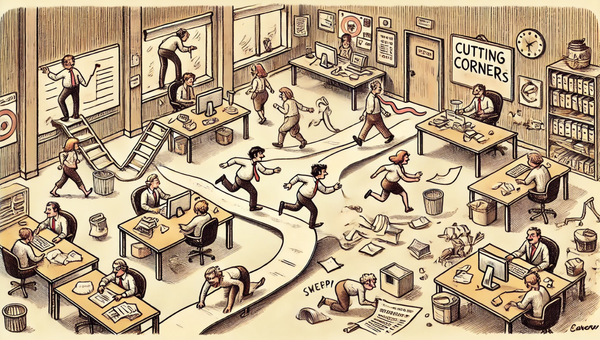MoP #7: Social Contracts, and a Common Misunderstanding About LLMs

One of the clauses of the modern social contract is that adults should follow the news. This may sound onerous, but the bar is quite low. We’re talking about being aware of the big stories, maybe engaging with a bit of analysis from different perspectives, perhaps even spending a few moments reflecting on how you can affect, and are affected by, the world around you. If someone at a dinner party says, “That [MAJOR NEWS STORY] is really upsetting,” you should be able to say something back other than “Huh?”
And yet, the tech world is full of people who swear off the news as if it were harmful to their health. They choose to be uninformed about the world, and they often want YOU to choose to be uninformed about the world as well.
It is, of course, not illegal to live an off-grid, news-free existence, but there are consequences. People may not want to be friends with you, work with you or date you. They may make judgments about your politics and values. Or, just a hypothetical, you may find yourself at a bar in New York one week after moving from San Francisco into a “decentralized network of apartments” in Brooklyn, arguing with a stranger about whether the news is actionable and, even if it is not, whether that releases you from the social contract to pay attention to it. (It does not.)
It has never been easier to fulfill this obligation. There are newspapers, newsletters, magazines, radio shows, podcasts, radio shows packaged as podcasts. Turn on the TV and beautiful people will deliver you the news in bite-sized segments at any hour of the day. ChatGPT will summarize it to you with middle-school level sentences. And for all the griping about the amateur “journalists” on TikTok, a bobbing head talking about a screenshot from a news article meets the bar. Again, the bar is very low.
I spent last Sunday afternoon making black bean soup, sipping madeira and listening to an episode of the Lenny podcast with venture capitalists John Zeratsky and Jake Knapp about “making time for what matters,” when Jake outed himself as news-free:
I spend very little time reading the news, and I don't have any news apps on my phone ... I think there is ... this feeling inside that I'm responsible for staying up to date with the most important news in the world...the good stuff, it'll come to you. People will share it with you or you'll hear about it. If it's a really big news story, you'll hear about it eventually. If it's going to affect you, actually, you'll hear about it.
What he’s saying is that in order to make time for what matters to him, in this case investing in tech startups, he has decided to stop being a load-bearing member of society. He thinks that he can be more successful and live a richer life by not engaging with what is happening in his community, his country and the world. And he’s so confident in that belief that he casually mentioned it on a popular podcast that is likely to be heard by people he may want to have a professional or personal relationship with in the future.
It would be as if I went on The Daily and casually mentioned that I believe that bathing is distracting me from doing my life’s work. But not to worry, I tell Michael Barbaro, my friends know to carry around Febreze. If I really need to shower, the rain will come to me.
All to say, please stay diligent about upholding the social contract, because there’s a tragedy of the commons waiting for us if we all choose to be as selfish as these tech folks. If your date knows if Andrej Karpathy is currently employed by OpenAI (he is not), but is unaware that there is a war going on in Gaza, do not go on a second date with them. You can do better.
I believe it’s possible to fight this fight without sacrificing our mental health. I’ve been inspired by my sister on this front: She has stopped flipping off bad drivers because she doesn't want to add more hate into the world and has switched to a slow motion finger wag instead. Early reports are that it’s quite effective.
A Fun fact about LLMs
I’m supposed to be holding down the Machines side of this blog, but we haven’t gotten into anything technical recently so I thought I’d throw in an LLM Fun Fact of the Week.
LLM Fun Fact of the Week ✨
LLMs produce text one word at a time. You can give them a prompt, say “Write me a poem,” and they will take that prompt and produce the word that they think is most likely to be the first word of the answer. Then they will take the prompt plus that one word and produce the most likely next word. And so on and so forth until they produce a STOP “word” that tells them to stop.
So, why does this matter? It doesn’t if you’re just using an LLM system like ChatGPT to write you some mediocre code or summarize Wikipedia.
But if you are participating in the broader conversation about the future of AI and whether it will produce autonomous agents that think like humans, it’s important to know that these systems cannot think ahead the way humans can. I am a fast talker, but even I will sometimes pause before explaining something and think, “does my audience have the context to understand what I’m going to say?” If not, I’ll step back and give a different answer. Or if sit down to write a holiday song about my friends that rhymes all their names, I may want to plan ahead to prevent ending up in a rhyme dead end. LLMs will not do that, it’s greedy decision making all the way down with no backtracking. Not a great strategy for writing poetry or taking over the world.





Comments
Sign in or become a Machines on Paper member to join the conversation.
Just enter your email below to get a log in link.